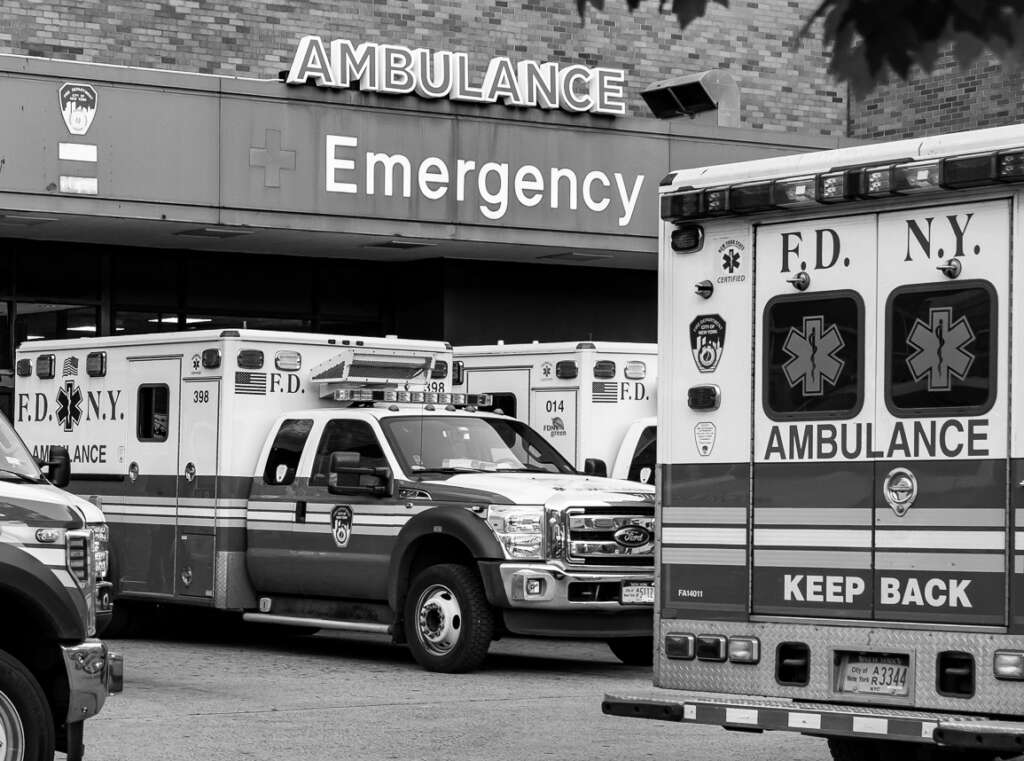“Coercive interventions are costly, traumatic, and ineffective. Community-rooted care, grounded in trust and lived experience, is how we build a system that prevents crisis instead of punishing it.”
Outside Lincoln Medical Center in the Bronx. (Photo by Adi Talwar)
Last month, I was in Harlem—the very community I serve as a peer specialist—when I found myself spiraling after days of little sleep and emotional overload, sparked by recent work with a client in crisis. My thoughts were racing. I was emotionally raw. I was not a danger to myself or anyone else. What I needed was rest and compassion.
Instead, I was confronted and surrounded by four NYPD officers, at my workplace, which felt like a punishment for feeling too much.
Despite explaining my state, and clearly asking for the city’s B-HEARD team—New York’s alternative crisis response program that sends trained mental health professionals, not police—I was handcuffed and forcibly taken to the Comprehensive Psychiatric Emergency Program (CPEP) at Lincoln Hospital.
I was not violent. I was not suicidal. I was overstimulated, overwhelmed, and scared. But my emotions were met not with care, but with force. I was paraded out of my workplace like a criminal.
At Lincoln, I was processed into what I call “The Loony Bin courtroom”—a holding area where people in crisis are warehoused until a psychiatrist determines their fate. There was no sunlight. The air was stale. No quiet. Just chaos: people screaming, others talking—some to themselves, some maybe to me—urinating on the floor, defecating on chairs; sandwiches thrown at the walls; a TV you could barely hear, mounted above a phone no one wanted to use.
One man slammed his head for hours, calling out for his mother. Another person was pinned down by two staff, and once defenseless, punched. And I watched one woman whisper the words “patient rights” with all the strength she had left—before she disappeared and never returned. When I shouted for accountability, I was punished with a forced injection. Haldol and Ativan—despite my explicit medical warning that I could not tolerate Haldol. My protest was ignored. I was silenced—sedated and erased.
The bitter irony? That day, I was scheduled to testify before the City Council, advocating for peers on mental health crisis teams. Instead, I found myself inside the very system I was trying to change. And the worst part is—I am not alone. I have more support than most ever get.
Every day across New York State, people in emotional distress are met with coercion instead of care. Especially those already experiencing high levels of trauma: people in altered states, people living on the street, people with mental health concerns, people of color. We are labeled dangerous when we are simply in need.
We must do better. And that starts with our elected leaders investing differently.
Leaders at both the city and state levels are moving us in precisely the wrong direction. The final state budget is poised to expand involuntary commitment authority, making it easier for what happened to me to happen to others. Our current mayor and mayoral hopefuls alike continue to advocate for forceful interventions, rather than voluntary, community-based care.
What we need is sustained funding for peer-led programs, housing-first models, culturally competent services, and alternatives to emergency rooms and police. The city can start by including a baseline budget allocation of $4.5 million to ensure competitive compensation for peer specialists to staff the city’s mental health crisis response teams, including B-HEARD.
This is not just the right thing to do—it’s the smart thing. Coercive interventions are costly, traumatic, and ineffective. Community-rooted care, grounded in trust and lived experience, is how we build a system that prevents crisis instead of punishing it.
I wasn’t dangerous. I was in danger—of being silenced, dismissed, and harmed by the very system meant to help.
I’m calling on our leaders at every level of government, but particularly our city elected officials who are actively crafting our next city budget: please do not double down on a system that fails people like me. Invest in one that sees us, hears us, and helps us heal.
We deserve care. Not cuffs.
Alex Brass is a New Yorker from the Upper West Side and advocate who works in Harlem serving vulnerable populations on the street. He identifies as a peer—someone who is in recovery from his own mental health struggles and problematic substance use, and is the Founder of ItAintDOPENYC, on a mission to curb the overdose crisis.
The post Opinion: I Needed Support. I Got Handcuffs. appeared first on City Limits.

